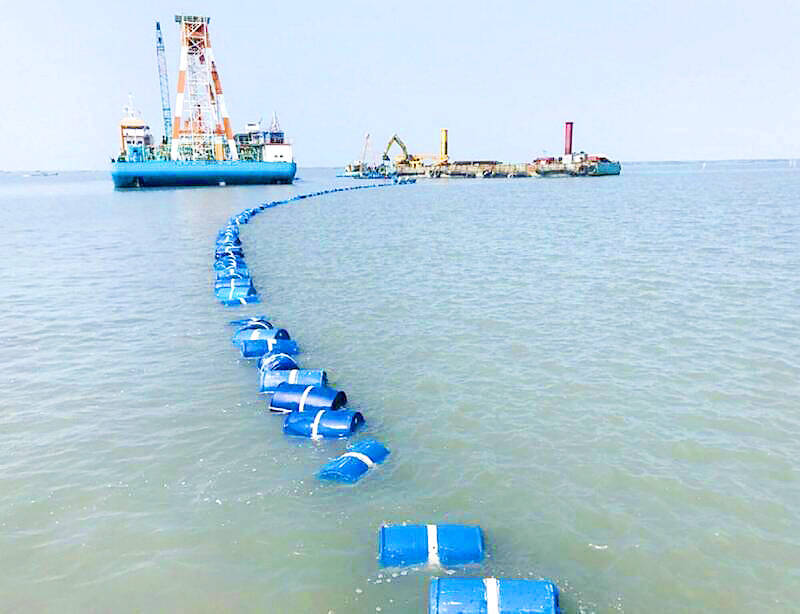The government is planning to build an Internet cable terminal in Tainan and lay two additional undersea cables to boost telecommunications resiliency, an official familiar with the matter said yesterday, speaking on condition of anonymity.
Two subsea Internet cables connecting Lienchiang County to Taiwan proper were severed in separate incidents allegedly involving a Chinese trawler and a cargo ship in early February.
The nation’s submarine cables are unevenly distributed in favor of northern Taiwan, with cable landing points in New Taipei City’s Bali (八里) and Tamsui (淡水) districts, and Yilan County’s Toucheng Township (頭城), while Taiwan’s fourth cable landing point is in Pingtung County’s Fangshan Township (枋山), the source said.

Photo courtesy of Taiwan Power Co
Southern Taiwan entirely depends on the three cables ending in Fangshan, they said.
The National Science Council has ordered the National Center for High-Performance Computing to plan a cloud server center and Internet cable landing point in Tainan, as well as a backup auxiliary node in Taichung, to bolster redundancy and security, they said.
The project is scheduled to be completed by 2025, they said, adding that private-sector entities have expressed interest.
Separately, the construction of the Southeast Asia-Japan 2 submarine cable system connecting Taiwan, Japan, South Korea and Singapore is expected to be completed by the end of this year, they said.
The system includes landing points in Tamsui and Fangshan, they said, adding that the operators decided to set up two landing points to ensure that a failure of one of them would not disconnect Taiwan from the system.
Moreover, the Apricot subsea cable, which is expected to go online late next year, has been rerouted to bypass the Philippines and Indonesia to enhance its security, they said.
Overall, 14 submarine cables link Taiwan with other countries, and the government is aware that China might try to attack them, they said.
However, several third countries also route Internet traffic through those cables, and Taipei and Beijing are aware that these countries have an interest in them remaining intact, they added.
Repairs on one of the cables connecting Lienchiang County were finished at the end of last month, restoring the outlying county’s regular Internet access, they said.
The National Communications Commission and the Cyber Security Center said Taiwan reported 51 service disruptions of subsea cables between 2018 and last year.
The disruptions include 18 that affected the Toucheng-Fanghsang dual landing points, 22 that affected the Tamsui landing point and 11 that affected the Bali landing point.
These events include 25 cases that were caused by trawler netting or ship anchors, 12 were caused by geological events, three were caused by equipment failure or wear on the cables, six were caused by scheduled maintenance and two were caused by errors made during maintenance.

INVESTIGATION: The case is the latest instance of a DPP figure being implicated in an espionage network accused of allegedly leaking information to Chinese intelligence Democratic Progressive Party (DPP) member Ho Jen-chieh (何仁傑) was detained and held incommunicado yesterday on suspicion of spying for China during his tenure as assistant to then-minister of foreign affairs Joseph Wu (吳釗燮). The Taipei District Prosecutors’ Office said Ho was implicated during its investigation into alleged spying activities by former Presidential Office consultant Wu Shang-yu (吳尚雨). Prosecutors said there is reason to believe Ho breached the National Security Act (國家安全法) by leaking classified Ministry of Foreign Affairs information to Chinese intelligence. Following interrogation, prosecutors petitioned the Taipei District Court to detain Ho, citing concerns over potential collusion or tampering of evidence. The

Seventy percent of middle and elementary schools now conduct English classes entirely in English, the Ministry of Education said, as it encourages schools nationwide to adopt this practice Minister of Education (MOE) Cheng Ying-yao (鄭英耀) is scheduled to present a report on the government’s bilingual education policy to the Legislative Yuan’s Education and Culture Committee today. The report would outline strategies aimed at expanding access to education, reducing regional disparities and improving talent cultivation. Implementation of bilingual education policies has varied across local governments, occasionally drawing public criticism. For example, some schools have required teachers of non-English subjects to pass English proficiency

NEGOTIATIONS: The US response to the countermeasures and plans Taiwan presented has been positive, including boosting procurement and investment, the president said Taiwan is included in the first group for trade negotiations with the US, President William Lai (賴清德) said yesterday, as he seeks to shield Taiwanese exporters from a 32 percent tariff. In Washington, US Trade Representative Jamieson Greer said in an interview on Fox News on Thursday that he would speak to his Taiwanese and Israeli counterparts yesterday about tariffs after holding a long discussion with the Vietnamese earlier. US President Donald Trump on Wednesday postponed punishing levies on multiple trade partners, including Taiwan, for three months after trillions of US dollars were wiped off global markets. He has maintained a 10 percent

TRADE: The premier pledged safeguards on ‘Made in Taiwan’ labeling, anti-dumping measures and stricter export controls to strengthen its position in trade talks Products labeled “made in Taiwan” must be genuinely made in Taiwan, Premier Cho Jung-tai (卓榮泰) said yesterday, vowing to enforce strict safeguards against “origin laundering” and initiate anti-dumping investigations to prevent China dumping its products in Taiwan. Cho made the remarks in a discussion session with representatives from industries in Kaohsiung. In response to the US government’s recent announcement of “reciprocal” tariffs on its trading partners, President William Lai (賴清德) and Cho last week began a series of consultations with industry leaders nationwide to gather feedback and address concerns. Taiwanese and US officials held a videoconference on Friday evening to discuss the